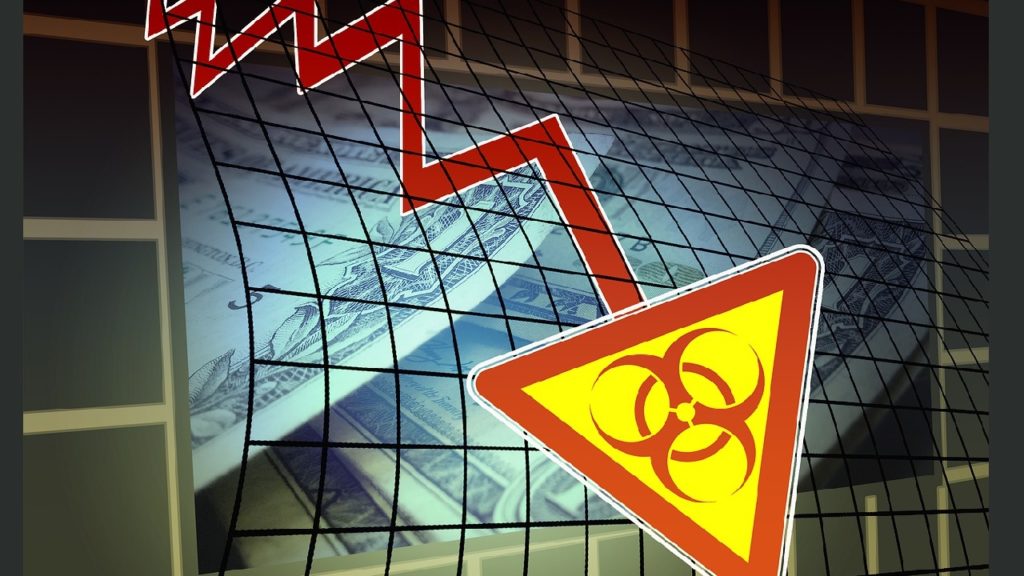Data Spotlights an Economic House of Horrors
We’re starting to get data revealing just how bad the coronavirus government shutdowns have impacted the economy. One commentator called it a “house of horrors.” But markets have barely shrugged. There doesn’t seem to be much concern. Peter Schiff said there’s a pass now on economic data.
Nobody cares because they just blame it all on COVID-19 and just assume that as soon as we just flip the switch and turn the economy back on that all the bad data is going to be good data.”
Over the last five weeks, over 26 million Americans have filed for unemployment. That’s over 16% of the US labor force. And that number almost certainly understates the number of unemployed. On top of the unemployed, millions of workers have had hours slashed and pay cut.
Last week, the US manufacturing PMI number came out, hitting an 11-year low of 36.9. The flash services PMI fell to an all-time record low of 27. IHS Markit puts out that services PMI number. It said, quote “The scale of the fall in the PMI adds to signs the second quarter will see a historically dramatic contraction in the economy.”
The data point that got the most attention Tuesday was consumer confidence. The Conference Board’s confidence index tumbled from 118.8 in March to 86.9, the lowest level in nearly six years. The present conditions index plummeted from 166.7 to 76.4. The AP called the 90-point drop “unprecedented.”
Peter said he doesn’t think consumer confidence drives the economy, but it does reflect the bubble.
If you have a bubble economy and people need to be confident enough or dumb enough to keep on borrowing and keep on spending, then confidence is important.”
Even with the dismal consumer confidence number, Peter said he thinks consumers are still overconfident.
People still assume that everything is going to get better. They still don’t understand how sick the economy was before the coronavirus. And so, it’s not going to have a rapid recovery. The best we’re going to do is recover from depression to recession.”
Consumer confidence wasn’t the only ugly number. The Richmond Fed Manufacturing Index for April came in at -53. The March number was already pretty weak at two. Projections for April ranged from -15 to -45.
Then there was the goods trade deficit. This used to be called the merchandise trade deficit. The Commerce Department announced Tuesday that the goods trade gap increased 7.2% to $64.2 billion in March.
The consensus projection was that the deficit would actually narrow to $55 billion. Keep in mind, the trade deficit is subtracted from GDP.
We saw declines in both imports and exports – so everything contracted. This signals a major drop in the economy.
And this is March. I mean, wait until we see the April numbers. They’re going to blow these out as far as how bad they’re going to be.”
US exports plunged by 6.7%. Some analysts say this reflects weakness in foreign markets, but Peter argues it’s really a signal of US weakness.
The reality is our production dropped. This reflects weakness in the US economy because we were not able to produce products to export.”
Peter said this portends ill for the US economy and for the future value of the dollar.
In the early days of the 2008 financial crisis, the trade deficit came down.
The opposite of what’s happening now. Instead of coming down, the trade deficit is actually getting worse. And the trade deficit is a major economic imbalance that needs to come down.”
That fact that we’re not seeing any downward movement in the trade deficit now indicates just how much weaker the US economy is today than it was in 2008, and how much more overvalued the US dollar is now than it was then.
Peter explained that the trade deficit is actually keeping the US economy afloat. America depends on the importation of goods produced overseas. But you have to look at the other side of that deficit. The US is, in effect, financing these imports with debt. Other countries are taking our IOUs. How long will they be willing to do that?
I would say that the days are numbered — that the dollar’s days as the reserve currency are going to come to an end. Because all of our trading partners who are sending us this stuff … real stuff that we consume that make our lives better – and while we paid for some of this stuff by exporting services, most of this stuff we just put on a national credit card. We just exported IOUs, paper dollars. So, why is the world giving us all this stuff that they have to produce and they have to divert resources to produce it – land, labor, capital. They could have used those resources to produce stuff for themselves. … What are they getting in exchange? They’re getting dollars.”
And what’s the point of holding dollars? Saving them to spend later. They are working now to earn dollars that they can cash in later and buy stuff. In effect, they are deferring consumption while the US accelerates consumption.
The joke’s on them. There’s nothing to cash in. We can’t make good these IOUs.”
If we don’t have the productive capacity to make good on the IOUs, they’re worthless. Once all of our creditors realize that, the party is over.
In this podcast, Peter also talks about the fact that the era of big government never ended.





 Peter’s back in Puerto Rico this week for his podcast after another week of record gold prices. In this episode, he discusses media coverage of inflation, this week’s CPI report, and Bitcoin’s weakening price relative to gold.
Peter’s back in Puerto Rico this week for his podcast after another week of record gold prices. In this episode, he discusses media coverage of inflation, this week’s CPI report, and Bitcoin’s weakening price relative to gold. This week Peter recaps another stellar week for precious metal. He also discusses Friday’s jobs report, commodity prices, and Bitcoin.
This week Peter recaps another stellar week for precious metal. He also discusses Friday’s jobs report, commodity prices, and Bitcoin. This week Peter returned from vacation, and he was just in time for a surge in the price of gold. He discusses the factors contributing to gold’s record prices, the similarities between today and the 1970s, and data pointing to future inflation in America.
This week Peter returned from vacation, and he was just in time for a surge in the price of gold. He discusses the factors contributing to gold’s record prices, the similarities between today and the 1970s, and data pointing to future inflation in America. This time Peter tackles Jerome Powell’s speech from Wednesday, in which he announced that the Fed is holding the federal funds rate between 5.25 and 5.5%. He also briefly discusses Bitcoin’s pullback and the media’s lies about Donald Trump.
This time Peter tackles Jerome Powell’s speech from Wednesday, in which he announced that the Fed is holding the federal funds rate between 5.25 and 5.5%. He also briefly discusses Bitcoin’s pullback and the media’s lies about Donald Trump.  In this episode, Peter reacts to a hotter-than-expected CPI report, big trades in Bitcoin, and the federal bill that would ban the popular social media app TikTok. He also notes silver’s historically low price, which is nearly 50% of its 2011 high.
In this episode, Peter reacts to a hotter-than-expected CPI report, big trades in Bitcoin, and the federal bill that would ban the popular social media app TikTok. He also notes silver’s historically low price, which is nearly 50% of its 2011 high.